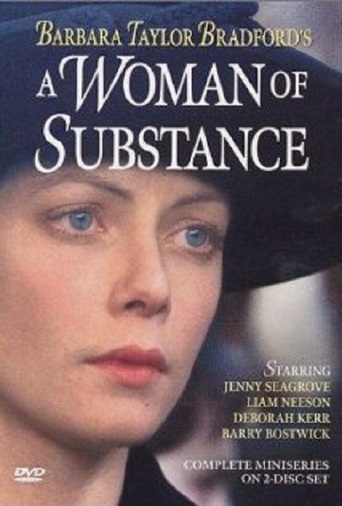tedg
Spoilers herein.Most people don't need much to justify their time in front of a screen. For them, this has two elements as an excuse: pretty good and convincing sets (except the war) and the remarkable face of Jenny Seagrove. Jenny isn't quite up to making her role believable in the large: what with sexual problems, revenge, passion-then-problems, incest, final emptiness. But she is fine in the small, especially at the beginning few hours where she isn?t a wasted human being, and someone we root for.Her face is very appealing, in fact is precisely half way between Nichole Kidman and Liv Tyler. I found two things remarkable here: the first is that most women (and there are many) have red hair or are often lit so that their hair is red. I think this is not an accident, and only part can be explained by familial relationships.The other wonder full thing is: why do we have this new genre of generational scope? I know whey we have the "mini-series" -- because it is a balance of costs, rewards and the attention span of viewers. But in the past, Austen?s time -- we would have focused on one set of characters and had room for development, not three generations and no room at all.The reason is the power of genre. Genre is a shorthand that allows the writer to assume with confidence that the viewer will assume certain things. Austen's Britain was a rigid class society, and every reader could be assumed to know and bring to the story elements that would otherwise have taken dozens of volumes to prepare. American audiences, the target of this project and the book, have no such benefit. As this is Pseudo-Austen (or more precisely pseudo-Bronte), it still has to have the superficial trappings: set in England, involve class struggle. But it has to invent the context pretty much from scratch, so we have to wade through all the stuff that Bronte's audience would know: the privilege, the sneering at servants, the sexual and economicexploitation and on and on. We have to SEE a father sacrifice his life for a Fairley. We have to SEE a Fairley attempt a rape. We have to SEE a Fairley brutalizing workers... and on and on.The problem is that we have to do so much work as viewers to advance the story. Too much. And by the end, the writers haven?t worked as hard. There is a crisis of sorts, and a resolution of sorts, but it is not related to all the work we have done.Ted's Evaluation -- 2 of 4: Has some interesting elements.
Creyola
The story follows the life of Emma Harte and her rise from a servant girl to the owner of a large empire of her own creation. The movie begins in the 1980's, but the bulk is Emma's recollection of her life from the age of 14 on (1900's-1940's.) Jenny Seagrove does a magnificent job portraying young Emma, and a young Liam Neeson plays the part of 'Blackie' wonderfully. This mini series matches the likes of 'The Thornbirds' and 'Pride and Prejudice' in it's acting and beautiful scenery, not to mention the story itself. Emma is a young woman of independence during a time when such a thing was a rarity. Definitely worth the 6 hours it will take you to watch it!
linga_97
A very good and entertaining story. Great performances by Jenny Seagrove and Deborah Kerr.I must, however, remain skeptical of how such things could take place in conservative Victorian Britain. After all, in more liberal U.S. the women's lib movement didn't come until the 1960s and 1970s
momnj
I enjoyed this series from beginning to end. Jenny Seagrove was fantastic as the young Emma Harte. Deborah Kerr was magnificent as the older Emma Harte. It was wonderful seeing her again. Liam Neeson was great as Blackie. This is the story of the fictional Emma Harte, a Yorkshire girl who works her way up from lowly domestic servant to the head of her own mega empire. She outsmarts and outdeals some of the biggest tycoons in the world. She finds love and loses love, but never loses her Yorkshire country values. Unfortunately, she's the mother of a bunch of money hungry, backstabbing children who plot against her. Have no fear, she knows how to outsmart them. I won't reveal the ending. You've got to see it for yourself. It was awesome! The only part of this series that I didn't like was Barry Bostwick's portrayal of Emma's Australian boyfriend, Paul McGill. His accent was virtually non-existant. He should've played a Canadian. He was also a bit whimpy for the part. The role needed someone with more presence and strength. His performance was mediocre at best. I highly recommend this series and it's sequel, Hold The Dream. Rent them. You won't regret it.


